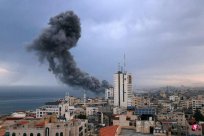Source: Taiwan United Daily
Author: Lin Jianshan
A new round of military conflict broke out in Israel and Palestine. Hamas launched military operations on Israel on the 7th, while the army launched a number of air strikes on the Gaza Strip.The global financial market has originally fallen into chaos due to rising interest rates. The outbreak of Pakistani conflict has led to surge in international oil prices, re -igniting generational inflation panic, and a new storm of the global market is brewing.
The previous geopolitical crisis in the Middle East usually leads to rising oil prices and decline in stock prices.In this Middle East conflict, the only thing that people pay attention to is the asset category that may have excited reactions. It should be just oil, which will not be expanded. It is expected that the conflict will not have a huge impact on the European or American economic market.However, it has added more uncertainty to the world's markets, and its volatility will rise sharply; short -term fixed income financial assets will once again become an international funded airport, and cyclical industries will become the focus.Both international inflation and economic growth will slow down, and geopolitical risks will become the focus of the global market.
As long as the conflict is limited to the Palestinian and the Israelites, it will not cause excessive negative impact on the international financial market.But if this influence waves the oil producer headed by Saudi Arabia, the price of crude oil prices will be more expensive, and it will have a negative inflation impact on the West; if it further leads to a decline in the world's economy, the international market will see long -term interest rates.Rising, the pattern of decline in the stock market.
The greatest possibility of conflict in the Middle East is the extensive international market emotions, which exacerbates the concerns of investors' commodities, especially the soaring oil prices; in recent weeks, international oil prices will fluctuate greatly.Consumer purchasing power.The first risk facing the global economy is the third wave of inflation. The original inflation wave has gradually weakened; however, the intensification of the tension in the Middle East will push high energy prices and weaken the efforts of central banks to control inflation.
Although the current geopolitical pattern of the Middle East is very different from the early 1970s, this conflict will respond strongly, which will disrupt Saudi Arabia's leading negotiations.In hostility, the United States may strengthen sanctions on Iran, leading to a huge rise in oil prices.This conflict took place after 50 years of oil embargo.Iran is both a major oil -producing country and a supporter of Hamas; if Israel attacked Iran retaliated and caused the risk of supply interruption, international crude oil prices will rise immediately.
The rise in geopolitical risks may promote investors to risk assets such as gold, US dollars, and US debt.But what is urgent to determine the international market is whether this Middle East conflict will promote investors to eagerly seek safety assets, avoid the holding of high -yield debt, or this will be the fuse of a new round of inflation panic?
The past experience is that as long as the international turmoil occurs, the US dollar will strengthen; in the past, there were no "direct" relationships with the United States on the surface, so the US dollar used to be the best asset of risk aversion.However, the protagonist of the Middle East conflict this time is Israel, which is the big gold owner behind the United States. President Bayiden has publicly announced that he will fully support Israel and will inevitably participate directly in the conflict without being unable to extricate himself.People are regarded as "important risk aversion assets" at the moment?I'm afraid it will be a big question mark.


